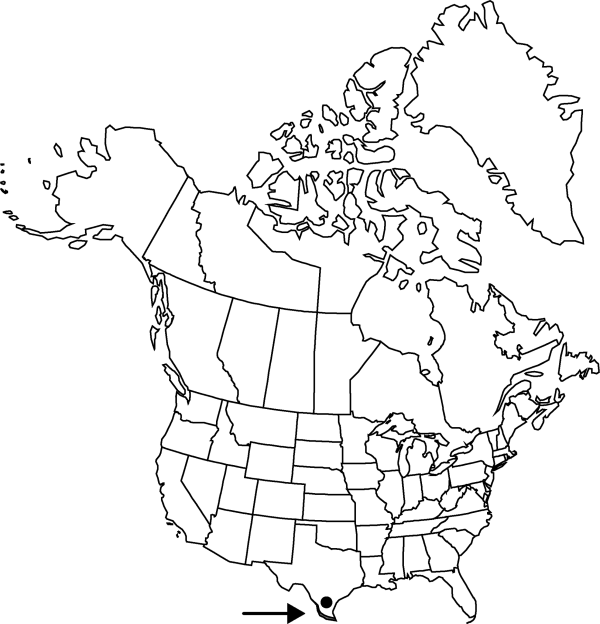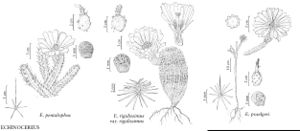Difference between revisions of "Echinocereus pentalophus"
Cact.-Verz., 20. 1859.
FNA>Volume Importer |
imported>Volume Importer |
||
| (5 intermediate revisions by 2 users not shown) | |||
| Line 8: | Line 8: | ||
}} | }} | ||
|common_names=Alicoche;ladyfinger cactus | |common_names=Alicoche;ladyfinger cactus | ||
| − | |basionyms={{Treatment/ID/ | + | |special_status={{Treatment/ID/Special_status |
| + | |code=F | ||
| + | |label=Illustrated | ||
| + | }} | ||
| + | |basionyms={{Treatment/ID/Basionym | ||
|name=Cereus pentalophus | |name=Cereus pentalophus | ||
|authority=de Candolle | |authority=de Candolle | ||
| + | |rank=species | ||
| + | |publication_title=Mém. Mus. Hist. Nat. | ||
| + | |publication_place=17: 117. 1828 | ||
}} | }} | ||
|synonyms= | |synonyms= | ||
| Line 36: | Line 43: | ||
-->{{#Taxon: | -->{{#Taxon: | ||
name=Echinocereus pentalophus | name=Echinocereus pentalophus | ||
| − | |||
|authority=(de Candolle) Haage | |authority=(de Candolle) Haage | ||
|rank=species | |rank=species | ||
| Line 50: | Line 56: | ||
|publication title=Cact.-Verz., | |publication title=Cact.-Verz., | ||
|publication year=1859 | |publication year=1859 | ||
| − | |special status= | + | |special status=Illustrated |
| − | |source xml=https:// | + | |source xml=https://bitbucket.org/aafc-mbb/fna-data-curation/src/2e0870ddd59836b60bcf96646a41e87ea5a5943a/coarse_grained_fna_xml/V4/V4_327.xml |
|subfamily=Cactaceae subfam. Cactoideae | |subfamily=Cactaceae subfam. Cactoideae | ||
|genus=Echinocereus | |genus=Echinocereus | ||
Latest revision as of 21:57, 5 November 2020
Plants branched, clumps to 20 × 100 cm. Stems weak, sprawling, soon decumbent [erect and rhizomatous], ± 10–60 × 1–2[–6] cm; ribs 4–5, crests sharp and straight to poorly defined and undulate; areoles 5–12 mm apart. Spines (3–)4–7(–9) per areole, usually very stiff and straight, yellowish, tan, ashy white to dark gray, or pale pink, tips dark, all terete; radial spines (3–)4–6(–8) per areole, spreading, 6–37 mm; central spines 0–1 per areole, porrect or ascending, 4–36(–60) mm. Flowers 6–10 × 7.5–10(–15) cm; flower tube 20–25 × 8–20 mm; flower tube hairs 3–6 mm; inner tepals brilliant pink or magenta distally with distinct white or yellow proximal regions of variable extent [very rarely white throughout], 3.5–6 × 9–18 mm, tips relatively thin and delicate; anthers orange-yellow; nectar chamber 3–6 mm. Fruits green, (10–)15–25 mm, pulp white. 2n = 22.
Phenology: Flowering Apr–May; fruiting 3-4 months after flowering.
Habitat: Tamaulipan thorn scrub, Agave lechuguilla-Hechtia associations, alluvial coastal plains, [pine-oak forests, limestone cliffs]
Elevation: 0-2200 m
Distribution

Tex., Mexico (Coahuila, Nuevo León, San Luis Potosí, Tamaulipas).
Discussion
Our northern plants of Echinocereus pentalophus are var. procumbens (Engelmann) P. Fournier; they have often been misidentified as E. berlandieri. Both taxa have often been misidentified as the Mexican species E. blanckii [often misspelled as E. “blankii”], of confused authorship. Confusing variation of E. pentalophus has promulgated misidentifications, misapplications of names, and attempts to recognize multiple taxa.
Selected References
None.
